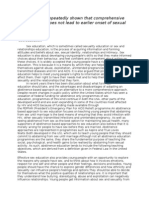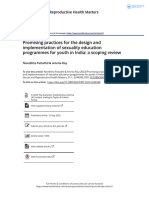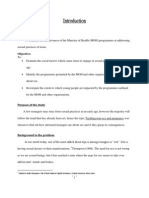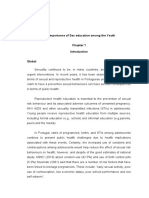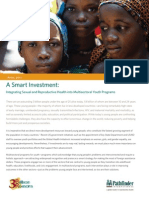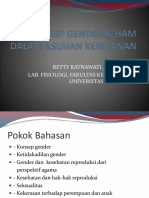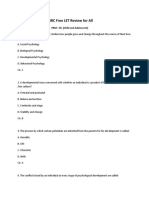TYPF Know Your Body Know Your Rights
TYPF Know Your Body Know Your Rights
Uploaded by
AdarshCopyright:
Available Formats
TYPF Know Your Body Know Your Rights
TYPF Know Your Body Know Your Rights
Uploaded by
AdarshOriginal Description:
Copyright
Available Formats
Share this document
Did you find this document useful?
Is this content inappropriate?
Copyright:
Available Formats
TYPF Know Your Body Know Your Rights
TYPF Know Your Body Know Your Rights
Uploaded by
AdarshCopyright:
Available Formats
Rationale
There are 235 million people living in India between the ages of 10 and 19. Among young women ages of 25 to 49, 20 % have had sexual intercourse before they were 15 years old and 55 % before the age of 18. By the time they are 18 years old, 28 % of of Indian women will have given birth to a child, and 49% will have been married. Of roughly 2.5 million people currently infected with HIV & AIDS, over 50 % of all new HIV infections take place among young adults between 15-24 years, and 40% of all cases of sexually transmitted infections occur within the same age group . The Population Council Survey Youth in India; Situation and Needs (2006-2007), a pan-Indian study conducted in both rural and urban areas in the states of Bihar, Rajasthan, Jharkhand, Maharashtra, Andhra Pradesh and Tamil Nadu shows that: Awareness about contraceptive use and HIV & AIDS is universal but in-depth knowledge remains limited. Only 15% of young people have access to information from parents and teachers on any sort of sexuality education; however a large percentage of youth were in favour of being provided with such information. A large majority have had some form of physical intimacy with partners before marriage, while gender differences in reporting pre-marital sex were high; 47% men and 26% women reported having had sex with their romantic partner. Condom usage was again seen to be limited, with just 13% men and 3% women reporting consistent condom use. Disturbingly, 33% women and 6% men reported pre-marital sex as being non-consensual through force or persuasion. Even after marriage, the vulnerability to sexual risk remains and condom use within marriage was also limited. The YP Foundations peer education work has shown that for many young people, concepts of the self, body and identity lie at the centre of much confusion and that this is compounded by the uncertainty of their position in society and what their entitlements and roles in regards to issues of sexuality, health and gender are. Young people today face increasing pressures regarding their bodies, sexuality and health particularly by way of conflicting norms and messages. On the one hand society projects messages of sexuality as being negative, associated with fear guilt and disease, while on the other hand it is seen as positive or desirable by media and peer groups . The ban on Adolescent Education Programme (AEP) in which young people and adolescents are equipped with skills to negotiate life decisions regarding sexuality during school years, in seven states of India has meant that large numbers of young people are being denied their rights to information and are being discriminated against and not being provided information that is important to their lives.
Nirantar, Sexuality Education Series, Part 1. 2008 National Aids Control Organizations Adolescent Education Programme. 3 IPPF CSE Framework.
1 2
Know Your Body Know Your Rights
THE YP FOUNDATION N 204, Greater Kailash, Part 1, New Delhi 110048. India. tel: +91 11 46792243/44 email: theypfoundation@gmail.com www.theypfoundation.org
About The YP Foundation
The YP Foundation is a youth run and led organization that supports and enables young people to create programmes and influence policies in the areas of gender, sexuality, health, education, the arts & governance. The organization promotes, protects and advances young peoples human rights by building leadership, and strengthening youth led initiatives and movements. Founded in 2002, we have worked over the last 8 years directly with 5,000 young people to set up over 200 projects in India, reaching out to 300,000 young people. Know Your Body Know Your Rights (KYBKYR) - The Peer Education Programme Conceptualised as the Project 19 Programme in 2006, KYBKYR is a 2 year long peer education programme project focused on training young people over a period of 4-6 months to become Peer Facilitators on the issue of Sexuality, Rights, Health and HIV & AID. The work so far has involved multiple people and mediums such as film, theatre, music, photography, communication and facilitative workshops. The programme urges young people to make informed choices and regarding their bodies, sexuality, rights, health, and relationships, enabling them to lead happier lives; it also encourages them to be respectful of all peoples rights, and of the choices that they make.
Focus from 2010-2012
As part of the advocacy and awareness initiative, we are conducting a 2 week- long festival, called the Know your Body Know Your Rights Festival in July 2010 which will bring together young people to advocate for young peoples sexual rights as a human right and advocate for Comprehensive Sexuality Education (CSE) with key stakeholders. Components of the programme include: Making concepts of sexuality and rights more accessible to the general public and carrying forward the peer education programme through different creative mediums, with a wider outreach. Beginning dialogue with key stakeholders such as school teachers, and curriculum setters on why CSE is a right. Capacity building and experience sharing amongst organisations and individuals working in different areas within sexuality, gender, health and rights with young people.
Activity Overview
An open-house workshop series conducted in Delhi, by a team of 15 young people who have been trained as Peer Educators, encouraging frank and non-judgmental conversation, about issues related to young peoples bodies, sexuality, rights and health with the emphasis on correct information as well as communicating such information in a comfortable, fun and nonintimidating manner. Writing and publishing of a Peer to Peer Training Manual on Sexual Reproductive Health Rights and HIV & AIDS as well as Development of research case studies, films and other such creative mediums to spread awareness about issues relating to sexuality, gender, health, rights and HIV & AIDS. A peer education report on the outcomes of Project 19, a peer-to-peer community programme, disseminating information on understanding young peoples sexuality, gender, rights and health. (2009 2010) Engagement with national, regional and local advocacy by lobbying for Comprehensive Sexuality Education and with the Adolescent Education Programme (AEP) through conferences and consultations during the past 3 years. The Project 19 Festival is an annual national-level festival which facilitates bringing together young people from diverse backgrounds to interact and exchange ideas and experiences on issues of sexuality, rights and HIV & AIDS. The Project has partnered with, and has been supported by, a range of organisations since inception some of these are TARSHI, CHP, IWHC, NACO, Punj Lloyd, Government of Nagaland, UNESCO, UNICEF, IPPF SARO, Ford Foundation and Moserbaer amongst others.
Key Principles
Affirm that it is important to talk about sexuality. Affirm that sexuality and expression of sexuality is intrinsic to each individual.
Recognize that sexuality is a normal and important part of all peoples lives and while different people have different understandings and ways of expressing their sexuality, all people should experience their bodies and sexuality in a positive and fulfilling manner. That every person has the right to access information services relating to sexual rights and health irrespective of any other considerations. Recognize that gender is a fluid concept and gender roles are based on narrow societal constructs. Every individual has the right to choose and ascribe to different gender and/or sexual identities. Respect, and not violate, other peoples bodies and personal spaces, laying emphasis on the importance of consent in relationships. Recognize that different people have different body types and address existing stereotypes relating to body types, sexuality and notions of what is attractive. Respect our bodies and take proper care with respect to nutrition, exercise, sexual health and get regular health checkups. Recognize the importance of accessing the correct information from reliable sources, leading to informed decision making.
You might also like
- Graduate Personal StatementsDocument40 pagesGraduate Personal Statementsgrignardreagnets100% (1)
- RRL Local and ForeignDocument13 pagesRRL Local and ForeignDick Jefferson Ocampo Pating100% (1)
- Sex Education: Sex Education Is Instruction On Issues Relating ToDocument18 pagesSex Education: Sex Education Is Instruction On Issues Relating TofruditaNo ratings yet
- Ippf Exclaim Lores PDFDocument40 pagesIppf Exclaim Lores PDFKeerthanaNo ratings yet
- Sex Education Is Instruction On Issues Relating To Human SexualityDocument5 pagesSex Education Is Instruction On Issues Relating To Human Sexualityprincess bulusanNo ratings yet
- Behh..debate ToDocument17 pagesBehh..debate ToMicah Jenelle BironganNo ratings yet
- Sex EducationDocument7 pagesSex EducationkhushalNo ratings yet
- Sex EdDocument18 pagesSex Edjoeriz jillNo ratings yet
- What Is Sex EducationDocument4 pagesWhat Is Sex EducationAquino Jomar AtosNo ratings yet
- Studies Have Repeatedly Shown That Comprehensive Sex Education Does Not Lead To Earlier Onset of Sexual ActivityDocument8 pagesStudies Have Repeatedly Shown That Comprehensive Sex Education Does Not Lead To Earlier Onset of Sexual ActivityRye Crew RomeroNo ratings yet
- Comprehensive Sexuality EducationDocument11 pagesComprehensive Sexuality EducationMonica GrinczukNo ratings yet
- SexyDocument3 pagesSexyOm ShahiNo ratings yet
- Script For CampaignDocument3 pagesScript For CampaignItsClarenceNo ratings yet
- SexedDocument13 pagesSexedOm ShahiNo ratings yet
- Victor Dagami's Complete WorkDocument65 pagesVictor Dagami's Complete WorkAaron KureNo ratings yet
- Promising Practices For The Design and Implementation of Sexuality Education Programmes For Youth in India A Scoping ReviewDocument31 pagesPromising Practices For The Design and Implementation of Sexuality Education Programmes For Youth in India A Scoping ReviewRahul YaDaVNo ratings yet
- SexyyDocument13 pagesSexyyOm ShahiNo ratings yet
- Rationale CorrectedDocument3 pagesRationale CorrectedRamcee CepedozaNo ratings yet
- Sexual Health Awareness ScaleDocument17 pagesSexual Health Awareness ScaleezazpsychologistNo ratings yet
- ICAH Annual Report 2010Document7 pagesICAH Annual Report 2010ILAdolescentHealthNo ratings yet
- Literature ReviewDocument13 pagesLiterature ReviewMaxine VirayNo ratings yet
- PR1 FinalDocument77 pagesPR1 FinalMaria PasiaNo ratings yet
- SexxDocument18 pagesSexxOm ShahiNo ratings yet
- DissertationDocument54 pagesDissertationRakesh Insan100% (1)
- Policy Brief #5 RH Service 2Document6 pagesPolicy Brief #5 RH Service 2Rara QamaraNo ratings yet
- Elsevier Reproductive Health Matters (RHM)Document11 pagesElsevier Reproductive Health Matters (RHM)Siva FarabibaNo ratings yet
- Caribbean Studies IADocument32 pagesCaribbean Studies IAShanikea Ramsay33% (3)
- Teenage Pregnancy: PovertyDocument4 pagesTeenage Pregnancy: Povertychristine nicolasNo ratings yet
- Sexuality Education OrginalDocument71 pagesSexuality Education Orginalaniamulu munachimNo ratings yet
- GyniDocument41 pagesGynitesfaye gurmesaNo ratings yet
- The Importance of Sex Education Among The YouthDocument23 pagesThe Importance of Sex Education Among The YouthPatricia Kate DominguezNo ratings yet
- Argumentative EssayDocument5 pagesArgumentative EssayfranciscojrmontillaNo ratings yet
- HUMAN RIGHTS Assignment 1Document9 pagesHUMAN RIGHTS Assignment 1dkhan73No ratings yet
- SaluEric New An Alluring Imp WPS Office 1Document7 pagesSaluEric New An Alluring Imp WPS Office 1Eric SaludaresNo ratings yet
- Sex Education Perception of Teacher Trainees In Uttar Pradesh (India)From EverandSex Education Perception of Teacher Trainees In Uttar Pradesh (India)No ratings yet
- RRL LINKS LOCALandFOREIGNDocument3 pagesRRL LINKS LOCALandFOREIGNADMIN GABNo ratings yet
- HIV MDG Factsheet WebversionDocument2 pagesHIV MDG Factsheet WebversionFarhan KabirNo ratings yet
- Sex Education in The PhilippinesDocument9 pagesSex Education in The PhilippinesJOHN DIEZEL AMPILNo ratings yet
- A Study To Evaluate The Effectiveness oDocument9 pagesA Study To Evaluate The Effectiveness oSieg AguillonNo ratings yet
- ArticleDocument19 pagesArticleEdson FranciscoNo ratings yet
- A Smart Investment:: EasonsDocument3 pagesA Smart Investment:: EasonsSuzaku LeeNo ratings yet
- Konsep Gender & Ham Dalam Asuhan KebidananDocument15 pagesKonsep Gender & Ham Dalam Asuhan Kebidanantri yulianiNo ratings yet
- Fundamentals in PHDocument9 pagesFundamentals in PHManchishi NabulweNo ratings yet
- Sex Education For 21st CenturyDocument44 pagesSex Education For 21st CenturyArif_Khan_1268No ratings yet
- SRHR Policy Brief NepalDocument15 pagesSRHR Policy Brief NepalYUWAnepalNo ratings yet
- Articulo Educación SexualDocument5 pagesArticulo Educación SexualCarol CelyNo ratings yet
- Chapter 1-fDocument34 pagesChapter 1-fkartik kasniaNo ratings yet
- Kate Valerie Quiban - OrangeDocument5 pagesKate Valerie Quiban - OrangeKate QuibanNo ratings yet
- An Assessment of The Necessity of Sexual Education For AdolescentsDocument4 pagesAn Assessment of The Necessity of Sexual Education For AdolescentsKIU PUBLICATION AND EXTENSIONNo ratings yet
- Sexual Health MonographDocument17 pagesSexual Health MonographScribdTranslationsNo ratings yet
- Putting Sexuality Back Into Comprehensive Sexuality Education - 0Document15 pagesPutting Sexuality Back Into Comprehensive Sexuality Education - 0YNo ratings yet
- Sexual Education FLCD 135Document7 pagesSexual Education FLCD 135Micah YapNo ratings yet
- ENG Policy Brief-Issue 1 Vol 5Document23 pagesENG Policy Brief-Issue 1 Vol 5Kartika FebrianaNo ratings yet
- Research Sex EducationDocument5 pagesResearch Sex EducationIvy Shenn CababatNo ratings yet
- Seminar On National Health and Family Welfare Programmes Related To Maternal and ChildhealthDocument21 pagesSeminar On National Health and Family Welfare Programmes Related To Maternal and ChildhealthKondapavuluru Jyothi81% (36)
- Sa Ygap EnglishDocument31 pagesSa Ygap EnglishBanele NdlovuNo ratings yet
- SRHR Info-PackDocument50 pagesSRHR Info-Packdehustle.emperorNo ratings yet
- Graduate School: St. Paul University Philippines Tuguegarao City, Cagayan 3500Document6 pagesGraduate School: St. Paul University Philippines Tuguegarao City, Cagayan 3500Jaydie PalNo ratings yet
- Wa0045.Document4 pagesWa0045.Anime LoverNo ratings yet
- Get to Know Yourself: A Training Package for Health Promoters, Health Educators, Community Health Workers and Peer Educators Promoting Sexual Health Among Young PeopleFrom EverandGet to Know Yourself: A Training Package for Health Promoters, Health Educators, Community Health Workers and Peer Educators Promoting Sexual Health Among Young PeopleNo ratings yet
- Let's Talk About Sex: A Practical Guide to Sex Education for AdultsFrom EverandLet's Talk About Sex: A Practical Guide to Sex Education for AdultsNo ratings yet
- Tsti June 09Document16 pagesTsti June 09Dan CohenNo ratings yet
- CBRC Free LET Review For All - PROF. ED. (Child and Adolescent)Document8 pagesCBRC Free LET Review For All - PROF. ED. (Child and Adolescent)Allysha Mae MaritanaNo ratings yet
- Needs and Problems of AdolescenceDocument21 pagesNeeds and Problems of Adolescencemistisur50% (2)
- David Kappes CasebookDocument8 pagesDavid Kappes Casebookapi-451574968No ratings yet
- Edited Manuscript QuequeDocument70 pagesEdited Manuscript QuequeMikay QuequeNo ratings yet
- Assignment 3 Final Assignment Jake DowsettDocument7 pagesAssignment 3 Final Assignment Jake Dowsettapi-321376162No ratings yet
- ReferencesDocument78 pagesReferencesmary ann manasNo ratings yet
- SmithBattle-2007-Public Health NursingDocument12 pagesSmithBattle-2007-Public Health NursingCinthya SantosNo ratings yet
- READING 4 UNIT 11 The-Impact-Of-Technology-On-Todays-YouthDocument3 pagesREADING 4 UNIT 11 The-Impact-Of-Technology-On-Todays-YouthDavid Isaac Ruiz ChaconNo ratings yet
- Knowledge and Perception of Teenage Pregnancy Among Secondary School Girls in Southern Ijaw Local Government Area of Bayelsa StateDocument8 pagesKnowledge and Perception of Teenage Pregnancy Among Secondary School Girls in Southern Ijaw Local Government Area of Bayelsa Stateijmb333No ratings yet
- Pulmonary ContusionDocument83 pagesPulmonary ContusionLouise Anne Agnazata GayoNo ratings yet
- Thesis Questionnaire About Peer PressureDocument4 pagesThesis Questionnaire About Peer Pressurejanaclarkbillings100% (2)
- Palmer EFFT 2009Document9 pagesPalmer EFFT 2009andreww .7No ratings yet
- Practical ResearchDocument2 pagesPractical ResearchFlora SedoroNo ratings yet
- Clinical Psychology Review: Daniel M. BlonigenDocument12 pagesClinical Psychology Review: Daniel M. BlonigenAna CristeaNo ratings yet
- Action PlanDocument7 pagesAction PlanKimberly BucagNo ratings yet
- Health Psychology Literature Review ExampleDocument7 pagesHealth Psychology Literature Review Exampleea59a2k5100% (1)
- National Child Policy 2011 English 04.12.2012Document15 pagesNational Child Policy 2011 English 04.12.2012shovan haiderNo ratings yet
- Unit 5 - ListeningDocument9 pagesUnit 5 - Listeningtoannv8187100% (1)
- EED441 CSU Cognitive Development in AdolescenceDocument16 pagesEED441 CSU Cognitive Development in Adolescencedquang2311No ratings yet
- The Problem and Its SettingDocument25 pagesThe Problem and Its SettingandengNo ratings yet
- Once More Unto The BreachDocument20 pagesOnce More Unto The BreacheeNo ratings yet
- Understanding The SelfDocument13 pagesUnderstanding The SelfElla Carandang100% (1)
- New Rich Text DocumentDocument18 pagesNew Rich Text DocumentRuth ChrysoliteNo ratings yet
- Personality Development of Girls Studying in NPEGEL and Non-NPEGEL SchoolsDocument7 pagesPersonality Development of Girls Studying in NPEGEL and Non-NPEGEL SchoolsinventionjournalsNo ratings yet
- Social Media Impacts On Teenage LifeDocument2 pagesSocial Media Impacts On Teenage LifeShavira NurulitaNo ratings yet
- Teens in Distress SeriesDocument4 pagesTeens in Distress SeriesdarinaralucaNo ratings yet
- Level of Self Worth Among Senior High School Students of The University of The Immaculate ConceptionDocument76 pagesLevel of Self Worth Among Senior High School Students of The University of The Immaculate ConceptionRey Jastin I. SauceloNo ratings yet
- Conclusions and RecommendationsDocument5 pagesConclusions and RecommendationsSinned Azodnem EvradoNo ratings yet









